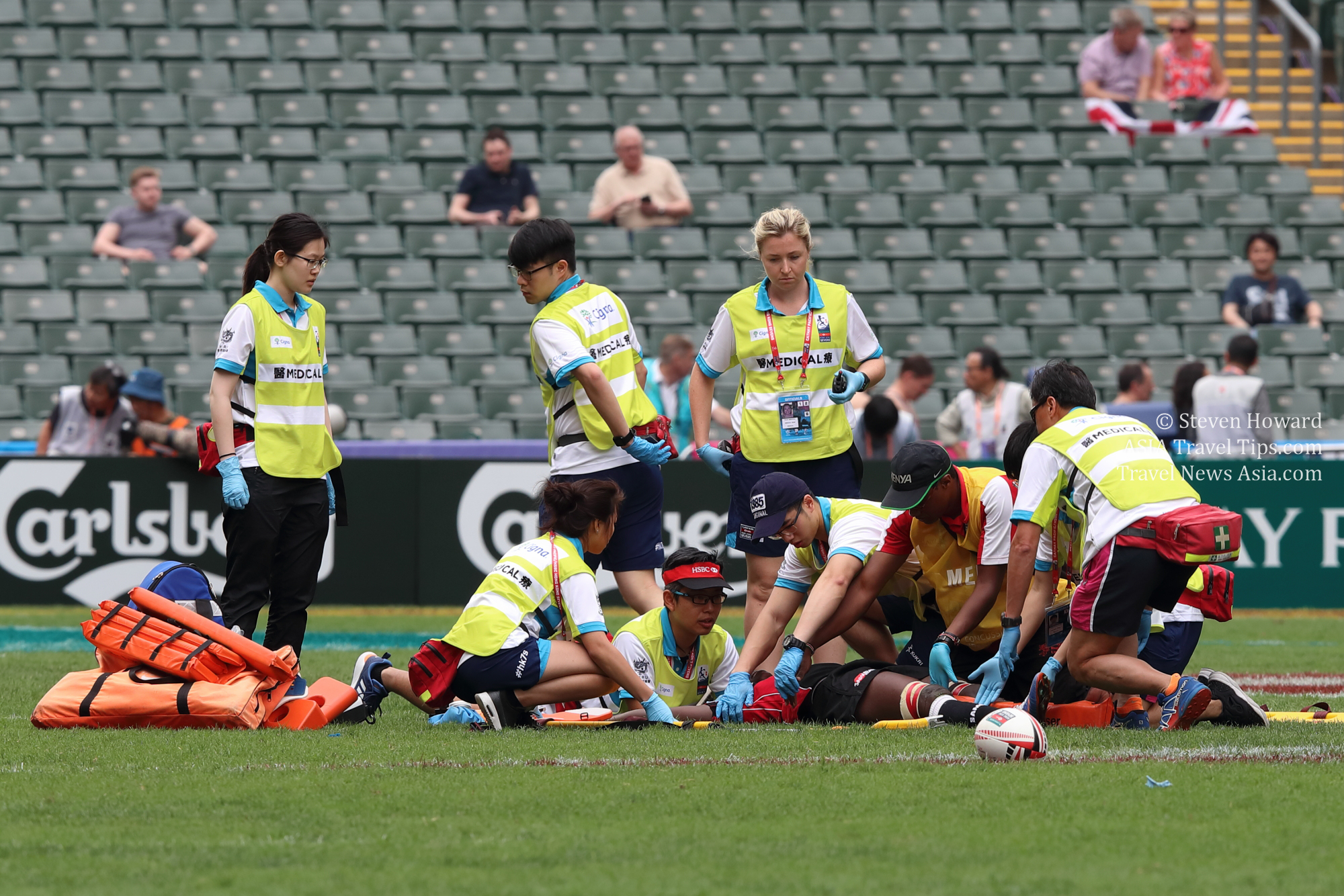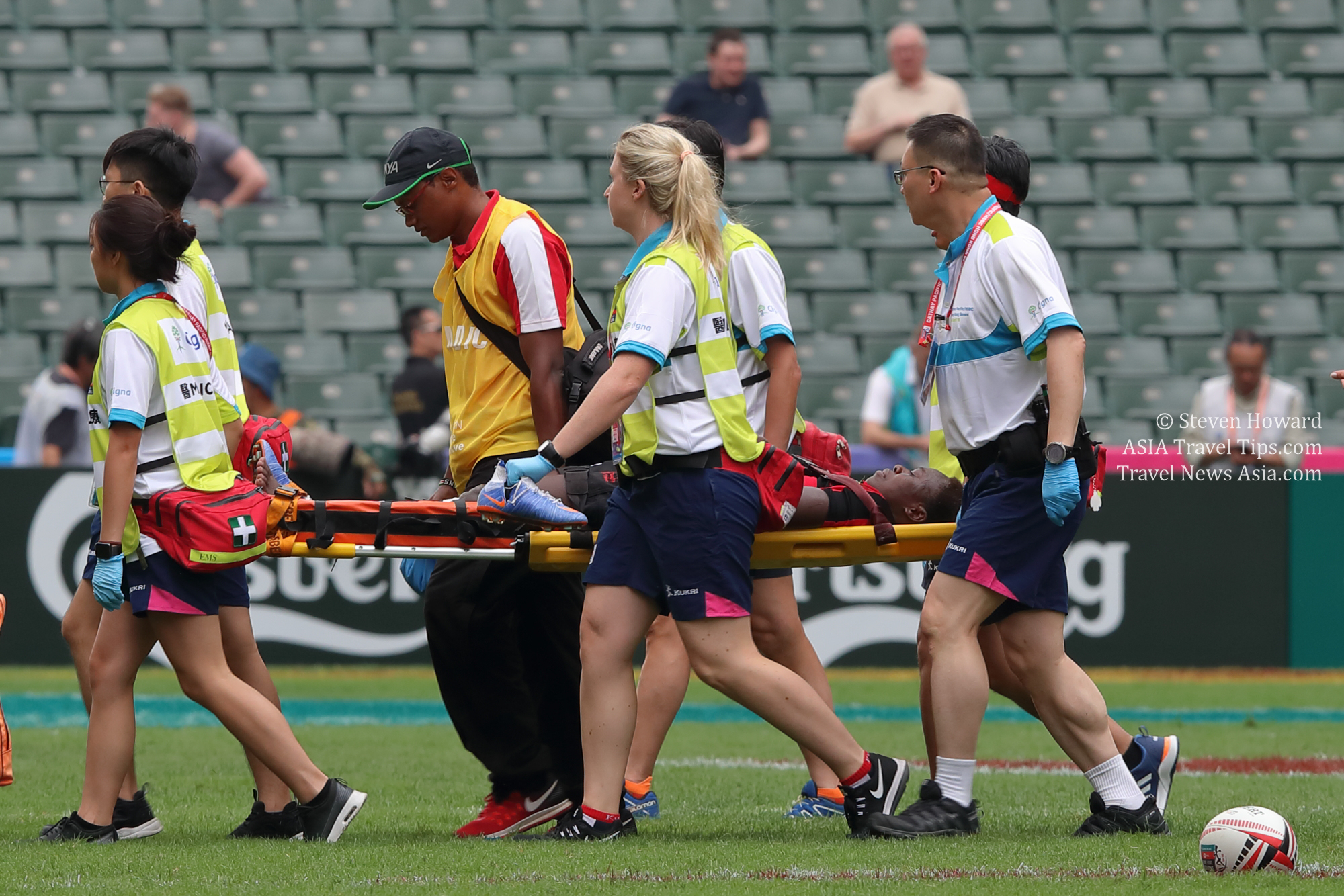|
World Rugby has set out its 2019 plan to further
mitigate the risk of injury in the sport, beginning with a
dedicated laws forum in March.
The plan is centred on detailed research and a
comprehensive understanding of the causes of injury, both in a
match and training environment, as well as a sustained and aligned
approach to the implementation of prevention strategies across the
game, from coaches, players and medics to referees. Approved by
Council in November 2018, it focuses on five key pillars:
Law review: World Rugby, in collaboration with
its unions and player representatives, will host a dedicated
injury prevention laws review forum in Paris in March, kicking-off
the quadrennial laws review cycle. With the tackle responsible for
up to 50% of match injuries and 73% of concussions
in elite rugby, stakeholders will review the latest global injury
surveillance data and consider the three-phase approach to
lowering the tackle height, while being encouraged to table
suggestions for innovative and robust injury-prevention via
possible law alteration.

Training load: Any player competing at Rugby
World Cup 2019 must have a �load passport� to encourage
best-practice training load management between club and country
environments (approved by the World Rugby Council in November 2018
and presented to tier one coaches), while all unions are
encouraged to optimally manage load between club and national team
environments based on published best-practice and guidance.
Injury surveillance: Under the revised premium
standards for elite competitions approved by the World Rugby
Executive Committee in September from 1 January 2019 any
competition applying to operate the Head Injury Assessment (HIA)
process must now: a) undertake detailed injury surveillance in
line with World Rugby standards to create one comprehensive annual
set of comparable and definitive global data, b) operate a
Match-day Doctor at every match, c) implement minimum video review
standards and d) enable World Rugby representation on any HIA
review panel.
Game preparation: Unions encouraged to adopt
the Activate injury-prevention warm-up programme developed by the
RFU and University of Bath, which has demonstrated a 60% reduction in adult concussions and a 70% injury reduction
at youth community level when used three times or more a week.
Tackle education: All unions encouraged to
ensure professional environments provide comprehensive training to
all young professional players in best-practice tackling
techniques as educated within community rugby programmes such as
Rugby Ready. (The FFR announced in December 2018 that they will
host seminars with all professional clubs in France).

World Rugby Chairman Bill Beaumont said, "World
Rugby, working in partnership with unions and leading independent
experts, continues to be committed to making the sport as simple
and safe as possible for all, reflected within our ongoing global
injury-prevention strategy. Much progress has been made, particularly in
the priority area of concussion, which is testament to the
injury-management programmes implemented across the game. However,
we continually strive for improvement, and with the full support
of our unions and their respective clubs, we can make further
preventative advances, particularly in the area of training load
management, which is a key contributor to match injuries. Our major focus is the tackle, which is the
most common facet of the game, and this year we will complete the
initial analysis on the reduced tackle height trials. We are also
hosting a wide-ranging laws forum in Paris in March, with a focus
on injury-prevention and how evaluation and evolution of the laws
might positively impact this area within the next four-year laws
review cycle."
The focus areas are central to World Rugby�s
continued prioritisation of player welfare, driven by the annual
Medical Commission Conference, which brings together union medics,
player representatives and leading independent medical experts to
review the latest data and trends and identify new evidence-based
areas of injury-prevention focus.
World Rugby Chief Medical Officer Dr Martin
Raftery said, "While the number of rucks and ball in play time
has increased over the past five years, the overall global
incidence of injury has not increased, which means that the
sport's medical standards and injury-prevention programmes in
elite adult rugby are having a positive impact. As a sport, we are continuing to drive
evidence-based interventions to further reduce that injury risk
and this should begin with training load management. Training
accounts for approximately 90 per cent of all player load and is a
significant contributor to match injuries, particularly
non-contact injuries (35 per cent of all injuries). Behavioural
change is required in the understanding and management of
individual player load and we will be launching research-based
player load guidance in partnership with International Rugby
Players this year. We will also continue to focus on changing
player behaviour in the tackle to reduce risk. The tackle trials
continue and will provide important data for us to analyse and
make recommendations to the Rugby Committee. The initial feedback
on the trials, particularly the high tackle warning system which
operated at the World Rugby U20 Championship, has been very
encouraging, but we need to see a full set of data before drawing
conclusions."
New Alterations to Laws of the
Game
Meanwhile, the World Rugby Executive Committee
has approved to adopt the revised Television Match Official (TMO)
protocol into Law 6.16. This operated as a trial in the November
window with the aim of reducing time impact and placing greater
decision- making responsibility on the referee.
Law 15 (Ruck): The Executive Committee has also
approved amendments to Law 15.4 to further clarify the laws
regarding offside lines at the tackle and ruck.
These changes have immediate effect, with the
exception of the revised TMO protocol which should be adopted for
all competitions which commence after 1 January, 2019. This
includes Super Rugby, the Six Nations and Rugby World Cup.
Competitions that are already underway may continue under the old
protocol until the current competition concludes. If these
competitions wish to adopt the revised protocol now, they can do
so.
Rugby pictures:
Pictures from 2019 Cathay Pacific / HSBC Hong
Kong Sevens,
Pictures from 2018 Cathay Pacific / HSBC Hong Kong Sevens,
Pictures from 2017 Cathay Pacific / HSBC Hong Kong Sevens,
Pictures from 2016 Cathay Pacific / HSBC Hong
Kong Sevens,
Pictures of Cathay Pacific / HSBC Hong Kong Sevens 2015,
Pictures of the Asia Rugby Sevens Olympic Games Qualifier in Hong
Kong,
Pictures of Singha Thailand Sevens 2015,
Pictures from the 2013 British & Irish Lions Tour in Hong Kong,
Pictures of Hong Kong Sevens 2014,
Pictures of Hong Kong Sevens 2013,
Pictures
of Chartis Cup 2012 and
Pictures of
Cathay Pacific / HSBC Hong Kong Sevens 2012.
See latest
HD Video
Interviews,
Podcasts
and other
news regarding:
Rugby.
|
